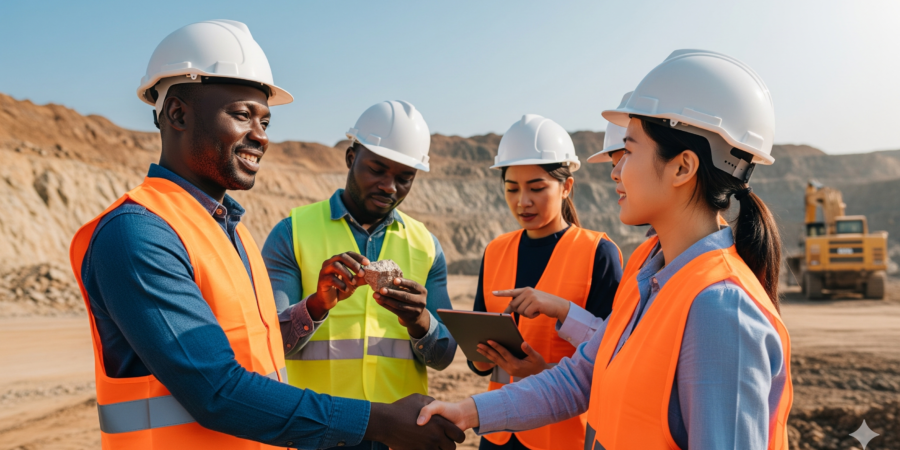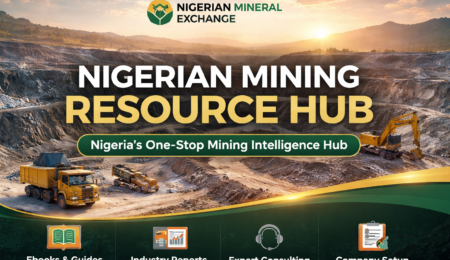In the world of mining investment, data, documents, and presentations can only tell part of the story. While license certificates, geological reports, and financial models are essential, they can never fully replace the insights gained from being on the ground.
For investors entering Nigeria’s solid minerals sector – from gold and gemstones to lithium and rare earths, on-ground due diligence is the difference between a profitable partnership and an expensive mistake.
This article explores the role of on-site due diligence in building successful mining partnerships, the risks it mitigates, and how serious investors can integrate it into their decision-making process.
What Is On-Ground Due Diligence in Mining?
On-ground due diligence refers to the physical verification and assessment of mining assets, stakeholders, and operations beyond paper records.
It includes:
- Visiting the mining site to verify activity and geology.
- Confirming mineral deposits through sampling and expert analysis.
- Meeting host communities and understanding local dynamics.
- Verifying license claims against actual ground coordinates.
- Assessing infrastructure like roads, water, and power that impact project viability.
In other words, it’s due diligence with boots on the ground.
Why On-Ground Due Diligence Matters
1. It Separates Genuine Projects from Scams
Fraudulent promoters may present polished documents, but a simple site visit often exposes inconsistencies:
- No actual mining activity on site.
- Mismatched coordinates between license documents and the physical ground.
- Host communities unaware of any mining agreements.
2. It Validates Geological Potential
Lab reports are valuable, but they must match reality. On-ground checks help confirm whether a project has the infrastructure, deposit size, and extraction potential to justify investment.
3. It Builds Trust with Local Partners
In Nigeria, mining partnerships often involve joint ventures with local companies. Being physically present shows seriousness, helps build trust, and ensures both sides are aligned in terms of expectations and responsibilities.
4. It Prevents Costly Legal Disputes
Many disputes in Nigerian mining stem from overlapping titles, community resistance, or environmental violations. These issues often become clear only when investors meet stakeholders on the ground.
Key Steps in On-Ground Due Diligence
Step 1: Physical Verification of License Area
Confirm that the license coordinates match the site location. Use GPS and GIS tools to validate the claim.
Step 2: Site Inspection and Sampling
Check whether the mineral deposits are real and accessible. Independent geologists should collect and test samples where possible.
Step 3: Stakeholder Engagement
Meet with:
- Host communities to confirm awareness and agreements.
- Local authorities to validate compliance.
- Current operators/workers to understand ground realities.
Step 4: Infrastructure Assessment
A rich deposit is meaningless if it’s in an inaccessible area. On-site inspections help investors evaluate logistics, cost of transport, and availability of supporting infrastructure.
Step 5: Environmental and Social Considerations
Mining projects succeed only with community acceptance and environmental compliance. Face-to-face engagements reveal concerns that papers cannot.
Case Example: When On-Ground Due Diligence Saved an Investor
An international investor once approached the Nigerian Mineral Exchange (NME) with an opportunity in gold mining. On paper, the documents checked out. However, our on-ground due diligence revealed that:
- The site was under community dispute.
- The supposed “gold-rich” veins were barely traceable.
- The license holder was overstating reserves.
That investor avoided a multi-million-dollar loss simply because we insisted on boots-on-the-ground verification.
How On-Ground Due Diligence Strengthens Partnerships
- Transparency – Each partner knows the realities before money changes hands.
- Shared Confidence – Joint venture agreements are built on verified facts, not assumptions.
- Long-Term Stability – Issues like community resistance or environmental concerns are addressed upfront, reducing risks of shutdowns or conflicts later.
How NME Supports Investors with On-Ground Due Diligence
At Nigerian Mineral Exchange (NME), we recognize that successful mining partnerships require more than documents. That’s why our consultancy service, the Nigerian Mining Investment Navigator, integrates on-site due diligence as a core pillar.
We provide:
- Physical site visits with geological experts.
- Community engagement reports to confirm local support.
- Full verification of titles and compliance with the Mining Cadastre Office (MCO).
- Partnership facilitation with credible Nigerian mining operators.
For investors serious about avoiding fraud and maximizing ROI, on-ground due diligence is not an option — it’s a necessity.
Related Services & Resources
- The Nigerian Mining Investment Navigator – Our premium consultancy for vetted, secure mining opportunities.
- Mining & Mineral Trading Company Setup (Nigeria) – Get professional support to establish your mining business legally and efficiently.
- Unlocking Nigeria’s Mineral Wealth: 113 Lucrative Business Ideas – Ebook packed with insights for entrepreneurs and investors.
📘 The Nigeria Mineral Trading & Licensing Blueprint (2026 Edition)
If you are serious about buying, selling, or trading minerals legally in Nigeria, you cannot afford to rely on guesswork, outdated advice, or hearsay. The regulatory environment is tightening fast, and costly mistakes now lead to permit denials, seizures, or permanent blacklisting.
That’s why we created The Nigeria Mineral Trading & Licensing Blueprint: 2026 Guide to Buying Center Licenses & Purchase Permits — an updated, clear, step-by-step, insider guide that shows you exactly how to obtain Mineral Buying Center Certificates, Purchase & Possession Permits, and related approvals without delays or regulatory traps.
This guide distills real regulatory procedures for 2026, compliance requirements, and practical insights used by serious operators — saving you months of confusion, wasted money, and avoidable risk.
If mineral trading is part of your business future, this blueprint is not optional — it’s protection.
Conclusion
Mining in Nigeria offers huge opportunities, but the risks are equally significant. By insisting on on-ground due diligence, investors not only protect themselves but also lay the foundation for transparent, secure, and profitable partnerships.
At the end of the day, mining is about what’s happening on the ground — not just what’s written on paper.
📌 Book your Strategic Investment Consultation with NME today and secure a trusted guide for your mining investment journey.
READ ALSO:





Leave a Reply